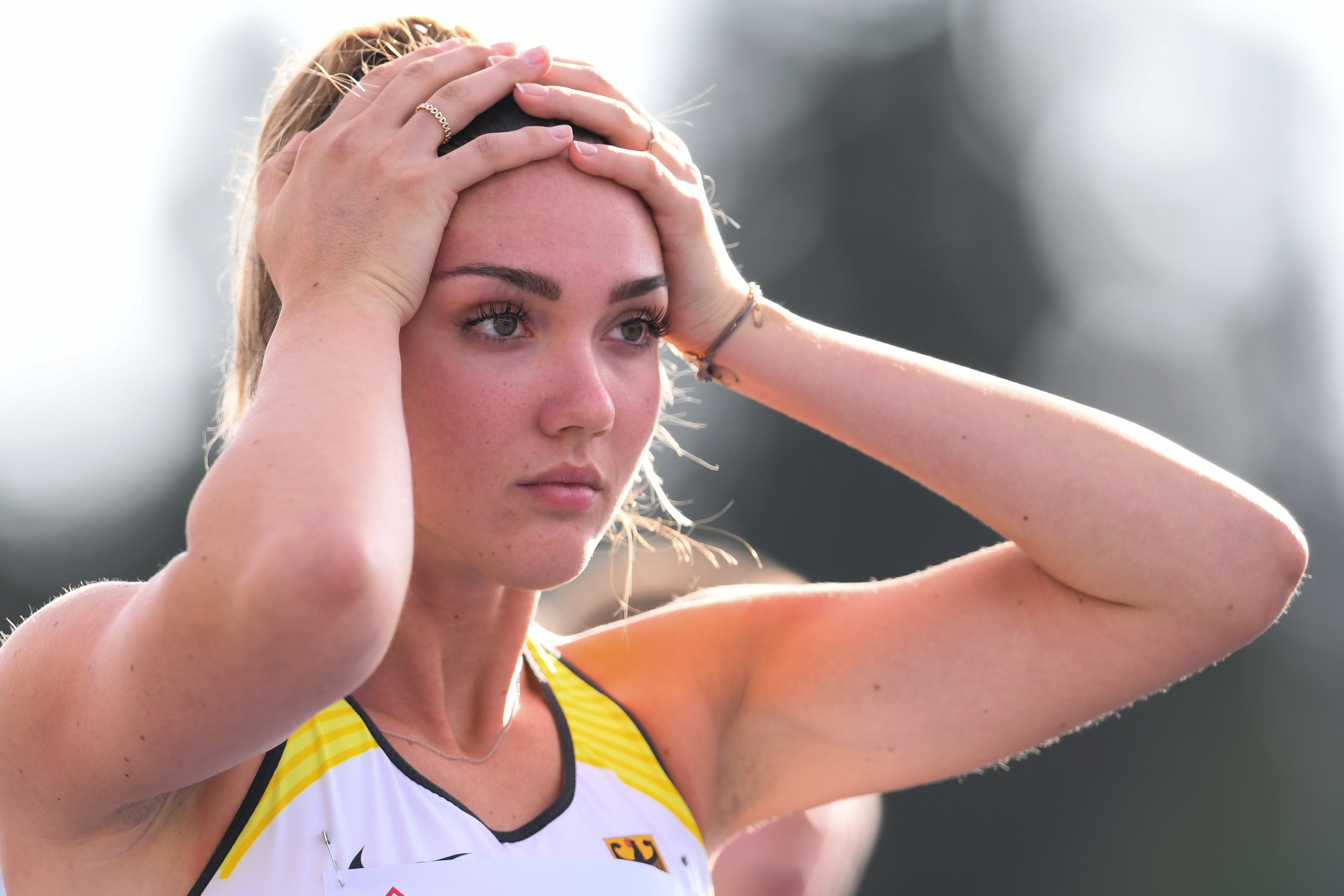As September dawns and we head into the last few weeks of the 2019 season, Sophie Weissenberg is preparing to embark on her first year of psychology studies. Instead of enjoying a long hot summer of relaxation, Sophie has had a rather more productive few months. She has the twelfth best heptathlon score in the world so far this year; a top ten finish at the most prestigious of all the combined events meetings; a silver medal from the European U23 championships, and a suite of new personal bests.
But that wasn’t quite the plan for the young German at the end of the 2018 season, where the target was simply qualification for the European U23s. And it was even further from the plan at the end of 2017, when Sophie was considering her future in the sport.
In the first few months of 2017, aged 19, Sophie had a solid domestic indoor season at 60m, hurdles and long jump. But in the second half of the year she took the opportunity to reflect for a few months on where her future might lie.
“I stepped away from the sport,” she says. “A few months, half a year, because I felt like I needed a break. I needed to sort my mind – if I want to do it, if I don’t want to do it; long jump, or heptathlon; and I think that was the right decision.”
So, what brought her back to competition?
“I just wanted to do sports again. And then I trained. And then I wanted to compete. And suddenly I’m standing in the heptathlon right before the 800m. And it was ‘Whoa, how did I get here – what’s going on?’ And then it was too late, and I was back!”
And back she was. In May 2018 Sophie posted a heptathlon score of 5747 in Halle, Germany and went on to compete in Ratingen. She then achieved a score of 6165 to win the heptathlon in the annual Thorpe Cup Germany v USA match in Knoxville, Tennessee in July 2018. And that led to an invitation to compete, for the first time, on the hallowed ground of the Götzis Hypomeeting in 2019.
In Götzis, she finished eighth overall and made it onto the famous podium, setting PBs in the hurdles (13.73) and 800 (2:17.06) in the process. She scored 6293, improving her lifetime best from the Thorpe Cup, and adding some 500 points to that 5747 from a year earlier in Halle. But 6293 was also an agonising 7 points short of the Doha qualifying score of 6300.
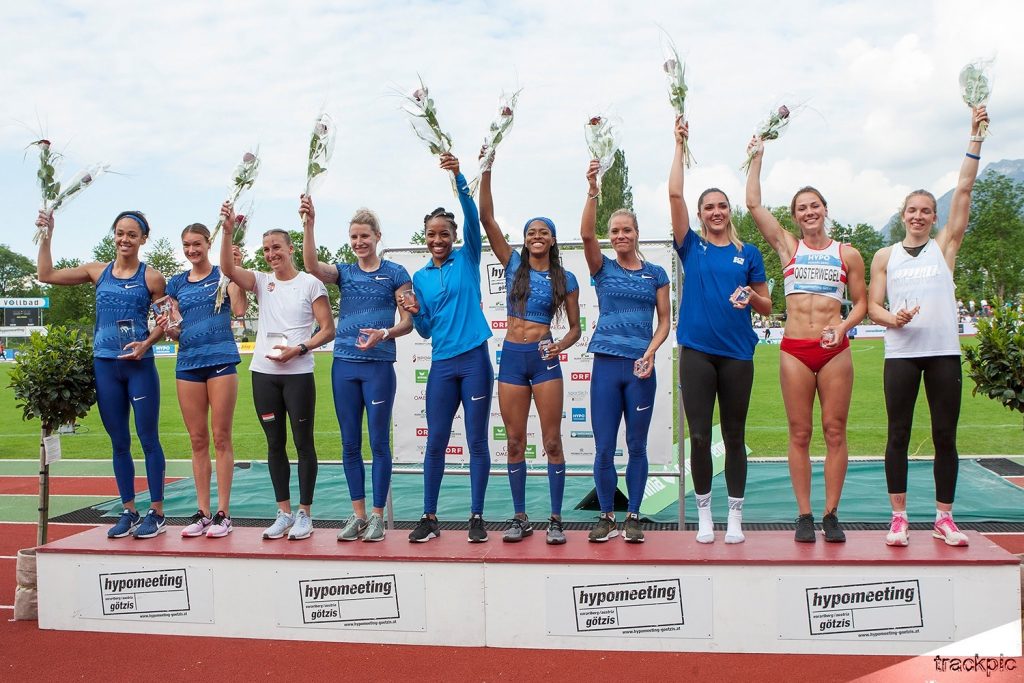
Sophie realised, a few steps after crossing the finishing line in the 800m, how close she had come to the magic number. The image of Carolin Schäfer consoling her younger teammate will stay with those who were in the Möslestadion that day. But Doha had not been part of the plan…had it?
“I scored 6165 last year, and I wasn’t sure if I could go better this year. One time over 6000 – I’m happy if I can do that again. And then in Götzis, I was nervous. It was such a big event. I was so happy that I could compete there. ”
“But then…such a big score! I didn’t know how I felt about it, because my main goal was the 5750 points to qualify for the European Under 23s. I hadn’t really, in my mind, scored the 6300. So, I was really overwhelmed as I saw my points and was like…oh, just 7 points away!”
“After Götzis, I really needed one or two weeks to come down, to relax, no sport at all, to bring my mind back. After that I was…OK. Now I know I can do it. I know I have the potential to do it. And I have more confidence. I trust myself a little bit more. I know I can do it now. “
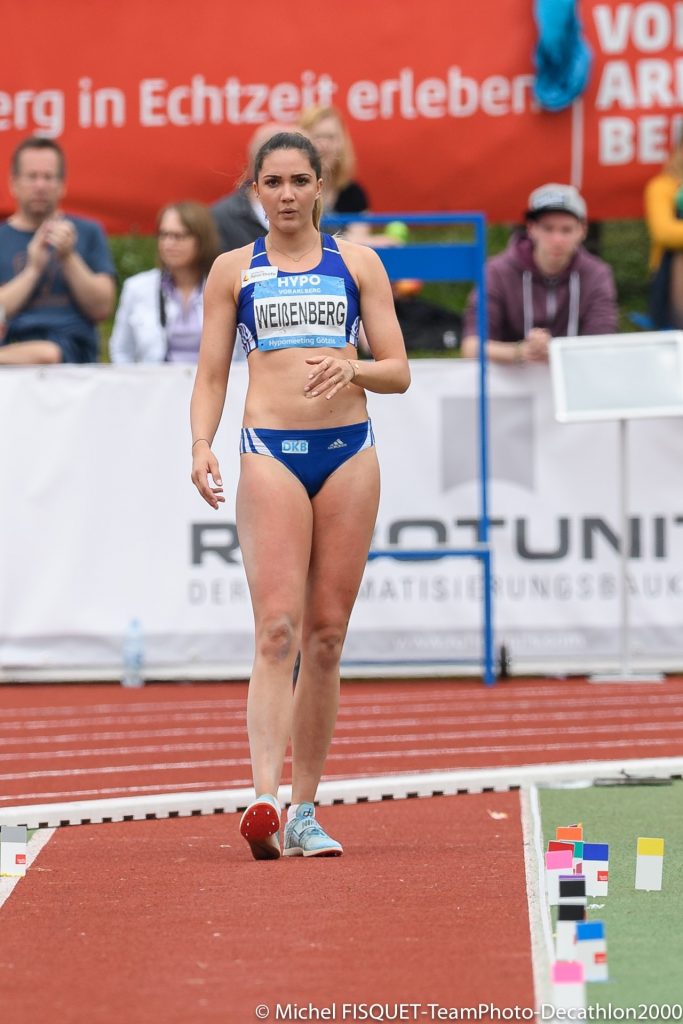
The European Under 23 Championships in Gävle, Sweden in July provided a further opportunity to secure the qualifying score for Doha. But, unlike the near perfect conditions for the decathlon a few days later, the conditions on the Thursday and Friday of the heptathlon conspired against good numbers.
“It was really hard for everyone. The headwinds, the rain, the changing winds. To score big points wasn’t easy.”
On Day 1, Sophie put together a series of 14.21 hurdles (into a -2.6 wind), 1.82 high jump, PB 14.18 shot, and 24.67 200 (-1.6) to become the overnight leader. She maintained that lead the next day with a long jump of 6.04 (+0.1) and javelin PB of 47.92, but she also became the athlete who was hunted down by her competitors – a new experience for her, and one that she’s not yet entirely relishing. “It’s horrible, I hate this position!” she said, immediately after the 800m.
The Swiss number one, Geraldine Rückstuhl, had her eye on Sophie as they went into the final two events. While Geraldine is one of the strongest heptathlon javelin throwers in the world and secured significant points in that event, she was nevertheless nervous going into the 800m. In the mixed zone after the race Rückstuhl said “I knew my PB in the 800 was better than Sophie’s, but I was so nervous, can I do it, or not? I just thought I need to run faster than ever before”. She did and ran a PB of 2:12.05 to Sophie’s 2:20.39, winning the heptathlon in 6274, with Sophie just under 100 points behind her with 6175.
Sophie was frustrated in the moments immediately after the heptathlon that the medal was silver and not gold. But the next day, as we talked while watching the decathlon shot put in the sunshine, she had a different perspective on the result.
“I was excited and nervous. It was my first major championships in the heptathlon, and I didn’t know what it would be like. So, I’m very happy with the silver medal.”
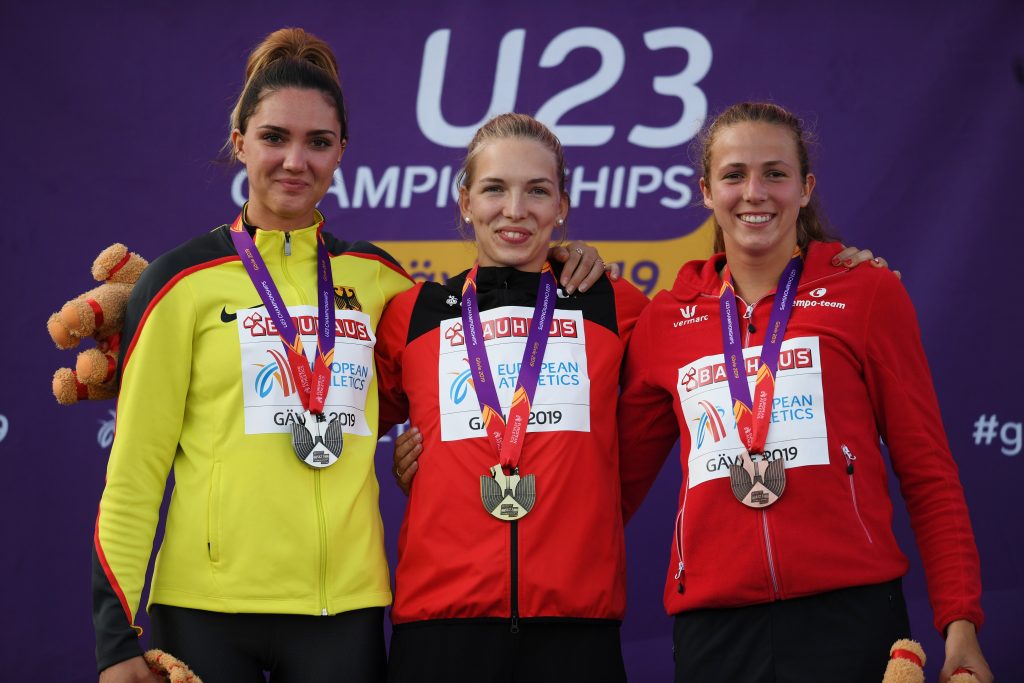
Photo Oliver Hardt/Getty Images for European Athletics
With highs and lows at senior and U23 level, at Götzis and at championships, Sophie is charting a steady course through her experience. Things are changing quickly, expectations being recalibrated, and frustrations turning into learning opportunities, on a journey of 500 hundred points in the space of 12 months.
Mirroring the views of her team-mate Niklas Kaul who won gold in Gävle, Sophie is clear about the importance of the age groups in providing valuable exposure to championships conditions. Sophie’s first international honours were as an 18-year old, winning silver in the long jump at the World U20 championships in Bydgoszcz in 2016. She jumped 6.40 to finish second, just 2cm behind Yanis David of France, in a year in which she competed primarily in the long jump, triple jump and 100m.
“It’s completely different. Götzis is a meeting where everything is for the heptathlon, and you go straight from one event to another. Here, you have long breaks. You can go to the hotel and have 3 hours before you run the 800. That’s completely different. It’s more exhausting in a championship.”
“Both are really fun. It’s very important to have the step of the U23s to get the feeling for championships, and to know what it’s like”
Aside from acclimatising to the environment and schedule of a Championships, Sophie is taking the opportunity of the occasion to learn from her peers and build strong support networks. The Gävle heptathlon field included four of the top 20 in the world in 2018 – Geraldine Rückstuhl, Hanne Maudens, Sarah Lagger and Alina Shukh – who between them have competed in senior championships at European and World level.
“The last 2 days were so fun; the girls were so nice and so sweet, and you could talk to everyone. You build up friendships over two days. Everybody in the 800, on the finish line – I know what you’re going through. I know it’s hard, but we’re all going through 2 days together.”
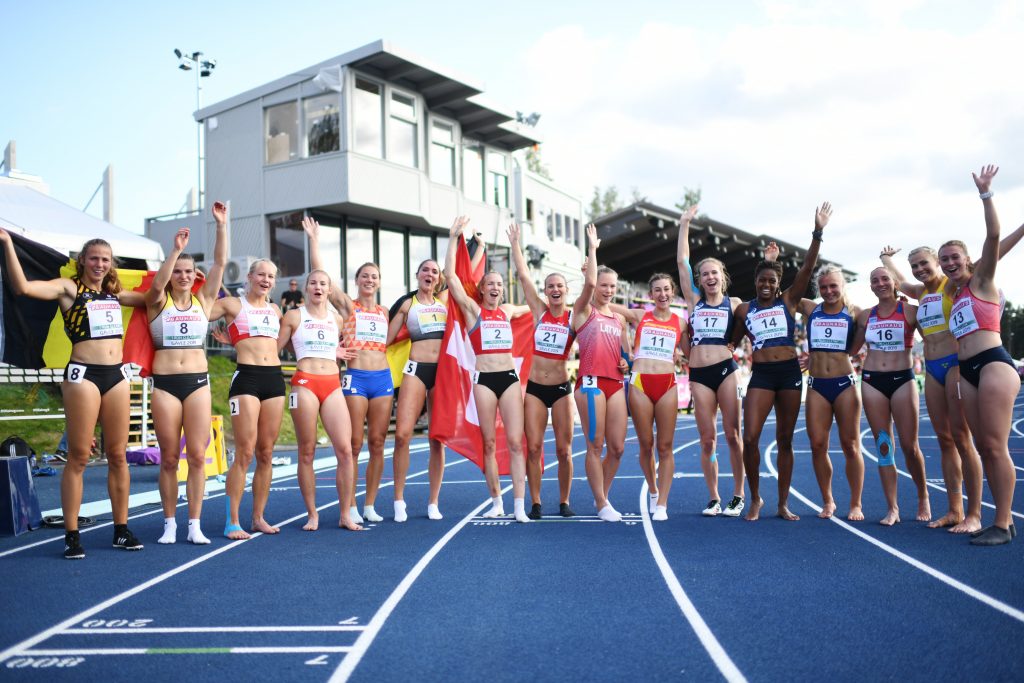
Photo by Oliver Hardt/Getty Images for European Athletics
The opportunity to compare notes with her peers on managing competition nerves, and absorb the experience of others, adds a valuable complement to Sophie’s training set-up. At home she is one of the oldest among her training partners, and the one providing advice and guidance to her less experienced teammates. While she has no one specific role model, she mentions Brianne Theisen-Eaton and Katarina Johnson Thompson as inspirations. Her family is also part of that mix.
“My parents always loved the sport. My mum, for sure, heptathlon (Sophie’s mother is 1990 European heptathlon silver medallist Heike Tischler) and my father played volleyball. I was on the track when I was such a little kid – track was always present. We always watched TV sports, worlds, Europeans, but my parents never put pressure on me. They always said, ‘If you want to do it then do it; if not then it’s also completely ok’.
And now, in competitions, if I ask her something my mum will always give advice, but if I don’t ask her, she isn’t like ‘you have to do this, and think about that’. She’s more in the background, and I love that about her.”
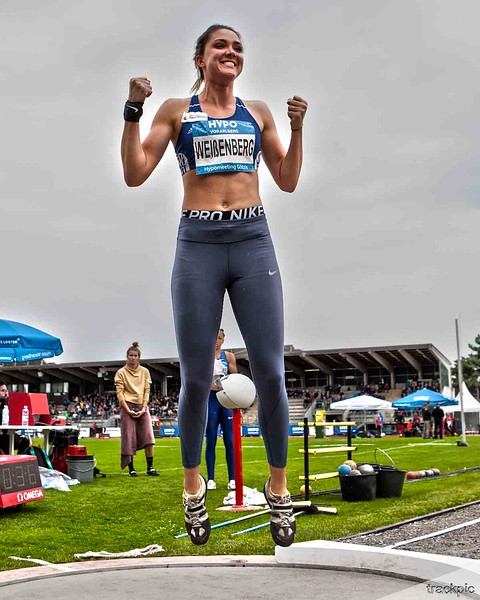
Sophie’s schedule for the future is already pretty busy. Conscious of the importance of life away from sport, she is starting psychology studies in October. And while on the face of it she appears to have no weak events, she is focused on how she can further improve her individual disciplines.
“My strong events are the jumps – long jump and high jump. Shot put – sometimes it’s good, sometimes it isn’t good, at the moment it is really good. Weak events – definitely the 800. I know I can run a lot faster. Also, in the hurdles, I think I can do better.”
At this point in the year only 13 heptathletes in contention for selection have the World Championships qualifying score of 6300. Some of those scores are from 2018, including Geraldine Rückstuhl, while Finland’s U23 star Maria Huntington achieved the qualifying score a few weeks ago.
Much of the field in Qatar will therefore consist of invited athletes. As the qualifying period draws to a close, Sophie remains in the top 12 in the world this year. While she should be in the mix for invitation by the IAAF, alongside her U23 peers Hanne Maudens of Belgium, Solene Ndama of France and Emma Oosterwegel from the Netherlands, she is pragmatic about whether she will be selected for Doha.
“I’m super happy with the season so far, and let’s see if I can do it for the Worlds or not.”
2018 might have been something of a surprise for Sophie after her time out in 2017, and 2019 has brought a further set of unexpected successes. But, whether or not Doha features in her immediate future, it’s a safe bet that we won’t be surprised by what Sophie can achieve in 2020 and beyond.
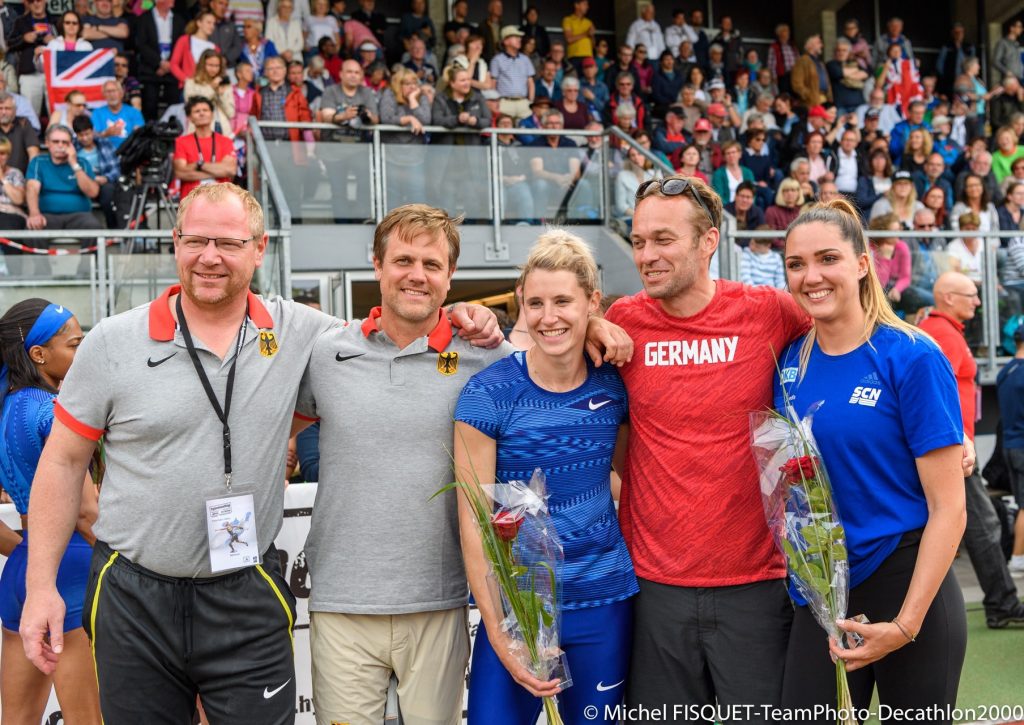
Photo credits: Oliver Hardt/Getty images for European Athletics, Michel Fisquet Team Photo Marseille, Olavi Kaljunen Trackpic.

